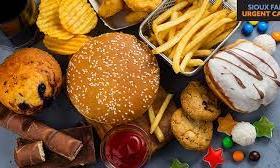
Scientist calls for tobacco-style warnings on ultra-processed foods
text_fieldsImage for representation only
Ultra-processed foods (UPFs), increasingly prevalent in diets worldwide, should carry warnings similar to those on tobacco products, suggested the nutritional scientist who introduced the term.
Prof Carlos Monteiro from the University of São Paulo will present his concerns about the health risks posed by UPFs at the upcoming International Congress on Obesity.
Monteiro emphasized the global shift towards UPFs, which are edging out healthier, less processed options. He highlighted that these foods are linked to a variety of chronic diseases, including obesity, diabetes, heart disease, and cancer. "UPFs are becoming a larger part of diets globally despite their health risks," Monteiro told the Guardian before the conference in São Paulo. "They are undermining diet quality and fueling the obesity epidemic and other diet-related diseases."
The increasing consumption of UPFs, such as cereals, protein bars, fizzy drinks, ready meals, and fast food, is particularly alarming in the UK and US, where over half of the average diet consists of these foods. This figure rises to 80% for certain demographics, especially younger individuals and those from disadvantaged backgrounds.
A comprehensive review published in February linked UPFs to 32 adverse health effects, including increased risks of heart disease, cancer, type 2 diabetes, poor mental health, and premature death. Monteiro, who developed the food classification system "Nova" 15 years ago, categorizes foods into four groups: minimally processed, processed culinary ingredients, processed foods, and ultra-processed foods.
Monteiro believes that public health campaigns are now essential to inform people about the dangers of UPFs. "We need public health campaigns similar to those against tobacco to address the risks of UPFs," he stated. He advocates for banning or heavily restricting advertisements for UPFs, introducing health warnings on packaging, and prohibiting the sale of these foods in schools and healthcare facilities.
Monteiro also supports heavy taxation on UPFs, with the revenue used to subsidize fresh, healthy foods.
He argues that food manufacturers make UPFs more appealing by ensuring they are convenient, affordable, and tastier than fresh meals, often resulting in overconsumption to maximize profits. Monteiro draws parallels between the tactics of UPF manufacturers and tobacco companies, noting that both industries produce products linked to serious health issues and premature deaths, invest heavily in marketing, and resist regulatory measures.
Despite Monteiro's strong stance, some experts caution against comparing UPFs directly to tobacco.
Dr. Hilda Mulrooney of London Metropolitan University argues that such comparisons are overly simplistic. "Cigarettes are inherently unsafe, but food provides essential nutrients," she explained. "Reformulating foods to reduce harmful ingredients is more complex than banning tobacco, as we need nutrients like fat, sugar, and salt for various functional purposes in food," reported The Guardian.

















